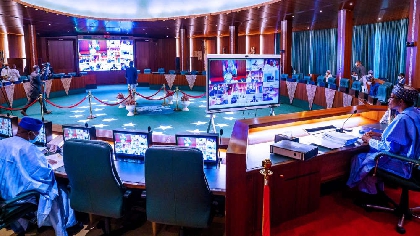The Federal Executive Council (FEC)on Thursday approved two major external loan facilities totalling $396 million to support critical humanitarian and health projects in Nigeria’s northern region.
FEC also approved the establishment of a Presidential Task Force on “Detty December”, a new federal initiative aimed at positioning Nigeria as a leading global destination for end-of-year tourism and entertainment festivals.
Minister of Finance and Coordinating Minister of the Economy, Wale Edun, disclosed the approval for the loans while briefing journalists at the State House, Abuja, after the FEC meeting presided over by President Bola Ahmed Tinubu.
He said the first facility is a $300 million World Bank credit to support Internally Displaced Persons (IDPs) and host communities across several states in northern Nigeria.
The second approval is for a combined $96 million credit from the Islamic Development Bank (IsDB) and the African Development Bank (AfDB); $50 million and $46 million respectively, for the Sokoto Health Infrastructure Project, to which the Sokoto State Government will also contribute counterpart funding.
“The $300 million World Bank credit is for internally displaced and host communities in various states in the North. The second approval is for the credit from the Islamic Development Bank and the African Development Bank for a total of $96 million to fund the Sokoto Health Infrastructure Project”, Edun explained.
The Minister described the projects as critical to President Tinubu’s Renewed Hope Agenda, aimed at addressing regional disparities, improving access to healthcare, and rebuilding communities affected by conflict and displacement.
Edun also briefed the Council on the state of the economy, noting that the latest data show a strong turnaround driven by reforms in the fiscal and monetary sectors.
“As at the second quarter, the economy was well and truly turned around in terms of growth. Growth was accelerating — over 4.2 percent — while inflation was down to 18 percent,” he said.
He attributed the recovery to the correction of market distortions, exchange rate stabilization, and improved investor confidence.
According to him, critical consumer spending indicators show that Nigerians are spending less of their income on essentials such as food, health, and transport than before.
“People are now spending about 50 percent of their income on basic needs compared to 90 percent before. There is more affordability, and the cost of living is inching downwards,” the minister noted.
Edun further highlighted Nigeria’s recent delisting from the Financial Action Task Force (FATF) grey list, describing it as a “major institutional achievement” that restores Nigeria’s standing in the global financial community and lowers the cost of cross-border transactions.
He said this milestone, combined with the recent oversubscription of Nigeria’s $2.35 billion Eurobond offer, which attracted $13 billion in bids, reflects global confidence in the Tinubu administration’s economic reforms.
“Despite recent political headwinds, investors focused on the fundamentals of the Nigerian economy. We were prudent in our borrowing, not exceeding what was approved or budgeted. The oversubscription shows a resounding vote of confidence in Nigeria”, Edun said.

